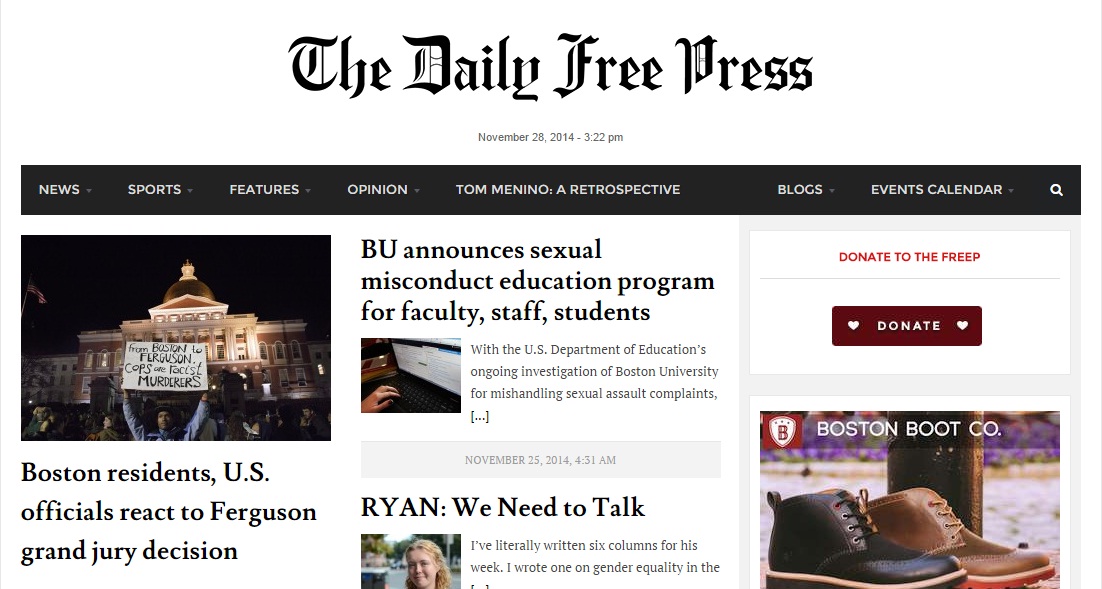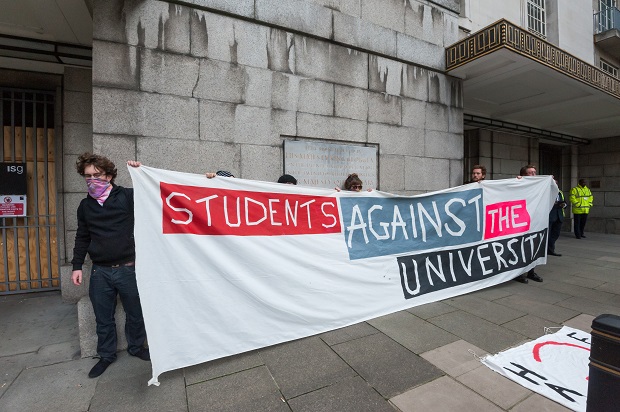The unravelling of academic freedom on US campuses
In 1970, the British socialist Mervyn Jones addressed the peculiar, indeed unique, passions that the Israeli-Palestinian conflict inspires, far more than any other. Jones was addressing fellow socialists, though his remarks apply to left-liberals too. He termed the conflict a “labyrinth” and wrote, “One cannot easily recall another problem over which Socialists of good faith have disagreed so much” – disagreed over everything from “sympathies” and “possible solutions” to an “analysis of the very nature of the problem.”
Almost from the moment that Hamas’ attacks of 7 October unfolded, the USA has been roiled by vitriolic debates that prove Jones’ observation – debates that, frankly, I have never witnessed in my lifetime. (The country was also torn by the Vietnam War, but that was a conflict in which tens of thousands of US soldiers were dying.) Both pro-Palestinian and pro-Israel (reductive terms that I try to avoid) advocates have been punished: A magazine editor and a leading university president have been fired, speakers have been cancelled, medical school doctors have been relieved of their posts. Legal organisations, non-profits, unions, businesses, publications and city councils have been wracked by extraordinarily hostile internecine discord. Job offers have been rescinded. Even a Santa Claus was fired.
But much of the attention has focused on the country’s most elite and influential universities, which train our future leaders and are the object of both awe and resentment. And just as the Israel-Hamas war revealed long-standing rifts between what I would call the anti-fascist and anti-colonial Lefts, it also revealed trends and practices that have been distorting academic life for at least the last decade, and that have been decried by some on the Right and a smaller minority on the Left.
In the most immediate sense, the problem started with a plethora of statements – some shockingly bloodthirsty – that issued from students at Harvard and other universities, which praised the 7 October attacks, blamed Israel for them, exalted the Hamas “martyrs” and eagerly anticipated future violence against Israel. Demonstrations calling for the elimination of Israel, which some regard as a genocidal aim, became frequent. Many university administrations were either silent about the attacks themselves or issued anodyne statements: a sharp contrast to their heartfelt condemnations of George Floyd’s murder in 2020 and to their support for the Black Lives Matter protests that followed.
The atmosphere at some campuses soon turned more ominous as some factions of the pro-Palestinian movement became more extreme: Jewish students were threatened with death; violently antisemitic messages flooded social media; classes were disrupted by students chanting Palestinian slogans; public spaces were defaced; speakers were shouted down; classrooms and faculty offices were blocked. What in the world was happening and, more important, why did university administrators seem to be paralysed? The presidents of Harvard, the University of Pennsylvania and the Massachusetts Institute of Technology – three of the country’s most selective institutions – were called before a congressional committee to explain.
It did not go well. Disaster, fiasco, pathetic, embarrassing, feeble, infuriating, hypocritical: the presidents’ testimony elicited a tsunami of outrage from various political quarters. The hearings were conducted by Congresswoman Elise Stefanik, a right-wing Trump supporter, but the criticism was hardly confined to the right. Laurence Tribe, who taught at Harvard Law School for decades and whose defense of constitutional rights has made him a hero to the liberal-left, described the Harvard president’s testimony as “hesitant, formulaic”, “bizarrely evasive” and “deeply troubling”.
At the hearings, the academic leaders offered bloodless, legalistic answers to the question of whether advocating the genocide of the Jewish people contradicts the schools’ codes of conduct. (Let’s not lose sight of how extraordinary it is that this question needs to be asked.) “To call their performance robotic would insult robots,” Heather Mac Donald wrote in City Journal. The three presidents might as well have been discussing a physics equation; they manifested little understanding of the fact that for many Jews, genocide is hardly a theoretical issue. In response to often hostile questioning, the academic leaders insisted that the First Amendment, and the academy’s longstanding commitment to academic freedom and the free exchange of ideas, meant that only harassing conduct, not heinous speech, could be subjected to disciplinary action. In essence, they argued that “context matters”: speech and action are not the same. In this, they were right.
The problem, however, is that academia, and especially elite academia, is the place where free speech goes to die. In fact, the nonpartisan free-speech organisation FIRE ranks Harvard as last among 248 US universities when it comes to protecting free speech. (University of Pennsylvania is second to last.) And that, too, has a long context.
***
The First Amendment is often misunderstood by outsiders, and by many Americans too. Its defense of free speech – and more important, free thought – was extremely radical in the 18th century and still is. It is the first clause in our Bill of Rights because the founders believed that in its absence no other rights would matter or, even, be possible. It prohibits any governmental body from either prohibiting or mandating speech. (Private universities are not required to adhere to First Amendment principles, though they claim to do so; as recipients of federal funds they are, however, subject to federal anti-discrimination and anti-harassment laws.)
There are many exceptions to the amendment. Calling for imminent violence is not protected. Death threats and extortion are not protected. One cannot falsely shout “fire” in a crowded theatre or blare music at four in the morning in a residential neighbourhood. Defamation is not protected, which is why a jury recently decided that Rudy Giuliani, one of Donald Trump’s former lawyers, must pay $148 million to two African-American election-poll workers whom Giuliani falsely accused of electoral fraud – accusations that led to years of horrifically violent, racist threats against them and that ruined their lives. But political speech – even burning the American flag – is protected.
Despite their stated dedication to First Amendment principles, many universities spend a lot of energy curtailing speech. Sometimes this emanates from the Right, and has the force of the courts and the government behind it. In some Republican-controlled states, most notoriously Florida, prohibitions on how teachers can, and cannot, address gender-related issues or teach the history of slavery have been legislated. Professors are leaving the state’s universities. Conservative groups like the erroneously-named Moms for Liberty are busy banning books, especially those dealing with LGBTQ or racial issues.
But at the elite universities, the assaults on free speech stem almost entirely from the Left, resulting in a culture of anxiety that muffles professors and students alike. So-called hate speech codes, which are both vague and capacious, dominate. Controversial views are frequently punished: at Harvard, a law school professor was stripped of his faculty deanship because he joined the defense team of an alleged sexual predator, which offended feminists, and an evolutionary biologist was vilified for asserting that there are “two sexes,” which outraged trans activists; she eventually left the university. At MIT, a noted geophysicist’s public lecture was cancelled because he had critiqued some aspects of affirmative action. These and other incidents are well-known within academia, and to some outside it, which is why the presidents’ sudden championing of free speech struck many as ludicrous or worse. Time and again, university administrators have placated angry students rather than defend either their own faculties or the free circulation of ideas; the word “feckless” comes to mind.
Talk of “privilege” abounds; in fact, in a sharp departure from its courageous history of defending political dissidents, many on the Left now argue that the First Amendment itself is a form of privilege and therefore needn’t be defended. A bizarre campus culture of “trigger warnings” and “safe spaces” has emerged. Underlying all this is the premise that offense is synonymous with actual danger – that speech and action are the same – and that students must therefore be protected from ideas that don’t accord with their own. Steven Pinker, a Harvard cognitive psychologist and robust free-speech advocate (who was the target of an attempted cancellation), has described the terrain: “Vast regions in the landscape of ideas are no-go zones, and dissenting ideas are greeted with incomprehension, outrage, and censorship.”
Complicating this situation has been the emergence of a group of ideas and practices called “diversity, equity, and inclusion” (DEI), which gained steam after George Floyd’s murder and the Black Lives Matters protests. It is difficult to separate the criticism of the presidents’ testimony from the DEI context. Though DEI aimed to increase minority representation, it is also associated with a range of highly contested ideas and has, perhaps ironically, created an intellectual monoculture: the very opposite of the multiplicity that diversity implies.
DEI is a constellation of ideas, but certain themes predominate. Many of its proponents consider any racial disparities in academic test scores or grades to be ipso racist, and argue for discarding such assessments. Some push for virtual quotas in hiring and student acceptances as the sign of “equity,” which they contrast to equality of opportunity. Others posit that US history should be taught as, primarily, the story of “structural racism”. All these ideas are debatable: except that, often, they are not. Throughout the country, DEI has become the reigning ideology at numerous universities, colleges and even elementary and high schools. Combatting “white hegemony” and “neo-colonialism” is a pedagogic aim; the Columbia School of Social Work’s framework for its entire curriculum focuses on “power, race, oppression and privilege.”
Faculty fear committing “micro-aggressions”, which can include anything from mispronouncing a student’s name to introducing an idea that makes them uncomfortable. (No one actually knows what a micro-aggression is, so everyone is kept on their toes.) All this has made faculty nervous, but far more important is that students are too: they tell me that they fear using the wrong word, expressing the wrong idea or posting the wrong thing on social media. As one explained to me, “We’re policing each other.”
Administrations are policing them too. Students and faculty at some universities attend mandatory anti-racist training sessions. Fealty to DEI principles is a stated prerequisite for hiring or promotion at some universities (including, at times, mine).
Meanwhile already hired professors can be required to post “anti-racist” affirmations, an eerie echo of the anti-Communist oaths required during the McCarthy era. Many of DEI’s critics emanate from the Right, but there are liberals and leftists, including prominent black intellectuals, who also reproach it: Randall Kennedy, a leading legal theorist at Harvard who identifies with the Left, has observed that “the DEI regime has a big problem, and that big problem is the problem of coercion.” Danielle Allen, an influential democracy theorist (also at Harvard) who was a member of the university’s initial DEI committee, has lamented the fact that like so many political projects, the positive intentions of DEI morphed into their opposite. In the wake of the Congressional hearings, she wrote, “Counter to the anti-racism agenda, we cannot create a framework for inclusion and belonging that is focused on accusation. . . Somehow the racial reckoning of 2020 lost sight of that core goal of a culture of mutual respect… A shaming culture was embraced instead.”
***
A crisis can be an opportunity, and it is unclear what direction universities will take in the wake of the Congressional hearings and the debates – welcome debates, in my view – that they have inspired. The University of Pennsylvania’s president was fired (cancelled, in effect), which strikes me as exactly the wrong response, if only because it implies that the problem lies with an individual rather than with a culture. Some have called for universities to expand the definition of hate speech to more specifically include antisemitism and to fold antisemitism into the DEI project: another wrong turn. (As David French, a conservative New York Times columnist and Harvard Law School grad argued, “Censorship helped put these presidents in their predicament, and censorship will not help them escape.”) Conversely, others have argued that DEI has proved to be inherently anti-democratic and should be abolished, though it is extremely unlikely that many universities will accede to that.
At the moment, both pro-Palestinian and pro-Israeli students feel beleaguered, victimised and unsafe, particularly on highly-politicised campuses in New York City. Jewish students feel intimidated when they walk through a gauntlet of masked protesters shouting “From the river to the sea!” as they go to class or see signs saying “Zionism is Fascism”. Pro-Palestinian students have been doxed – an indefensible attack on their right to expression. Anti-Israeli events have been cancelled, and Students for Justice in Palestine, the most extreme group, has been suspended by several universities: sometimes for speech, sometimes for actions. Dueling headlines in a recent edition of the New York Times capture the atmosphere well: “Defenders of Palestinians Feel Muzzled on Campus” and “Feeling Estranged, Some Jews Wonder if They Have a Place at Harvard”.
Allen has stressed the urgency of the situation: “The health of our democracy requires renovation of our colleges and universities,” she wrote. My own dream is that faculty and students will become unfettered, that an atmosphere of robust intellectual debate will be fostered, and that faculty can raise a generation of students to be fearless, independent critical thinkers unburdened by dogma, which is the prerequisite for an informed citizenry. But changing a culture is a difficult task, far more so than issuing new guidelines. And it is actually quite hard to get the balance right between speech and harassment, and to figure out if, say, overt support for terrorist acts crosses the line from one to the other. Allen admits, “We do not know how to protect intellectual freedom and establish a culture of mutual respect at the same time. But this must be our project.”



